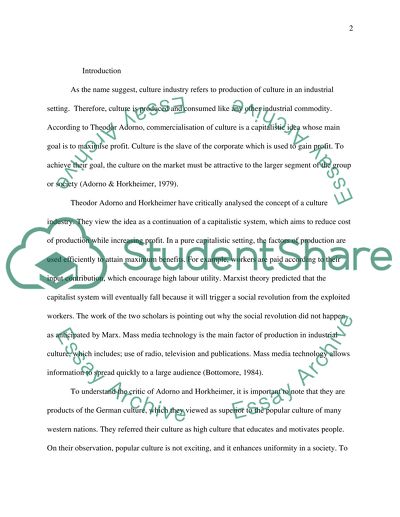Cite this document
(“Explain T. Adorno and M. Horkheimers critique of the culture industry Essay”, n.d.)
Explain T. Adorno and M. Horkheimers critique of the culture industry Essay. Retrieved from https://studentshare.org/journalism-communication/1497508-explain-t-adorno-and-m-horkheimers-critique-of-the-culture-industry-and-discuss-whether-these-are-still-relevant-for-understanding-cultural-production-today
Explain T. Adorno and M. Horkheimers critique of the culture industry Essay. Retrieved from https://studentshare.org/journalism-communication/1497508-explain-t-adorno-and-m-horkheimers-critique-of-the-culture-industry-and-discuss-whether-these-are-still-relevant-for-understanding-cultural-production-today
(Explain T. Adorno and M. Horkheimers Critique of the Culture Industry Essay)
Explain T. Adorno and M. Horkheimers Critique of the Culture Industry Essay. https://studentshare.org/journalism-communication/1497508-explain-t-adorno-and-m-horkheimers-critique-of-the-culture-industry-and-discuss-whether-these-are-still-relevant-for-understanding-cultural-production-today.
Explain T. Adorno and M. Horkheimers Critique of the Culture Industry Essay. https://studentshare.org/journalism-communication/1497508-explain-t-adorno-and-m-horkheimers-critique-of-the-culture-industry-and-discuss-whether-these-are-still-relevant-for-understanding-cultural-production-today.
“Explain T. Adorno and M. Horkheimers Critique of the Culture Industry Essay”, n.d. https://studentshare.org/journalism-communication/1497508-explain-t-adorno-and-m-horkheimers-critique-of-the-culture-industry-and-discuss-whether-these-are-still-relevant-for-understanding-cultural-production-today.


